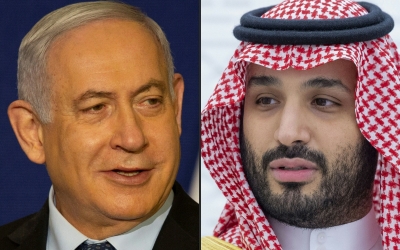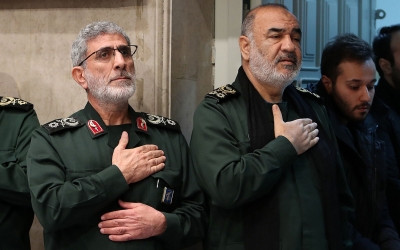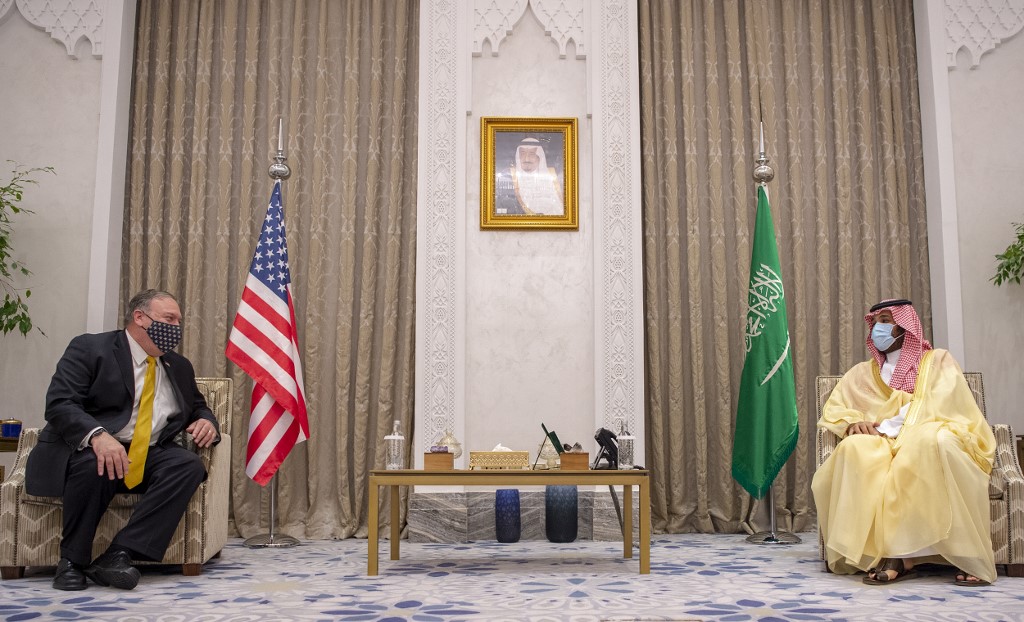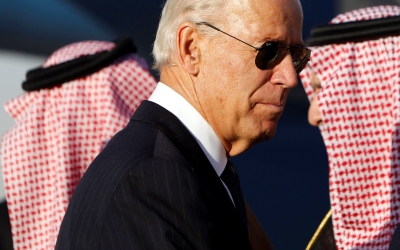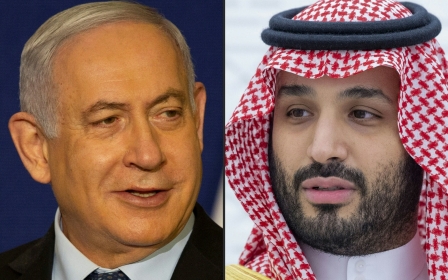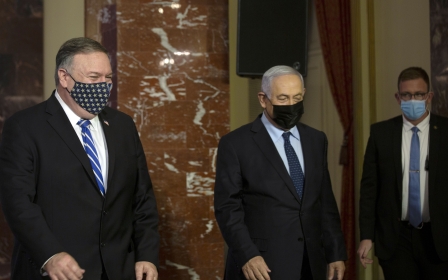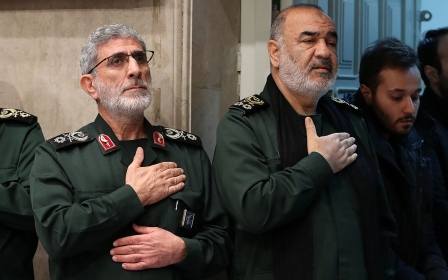EXCLUSIVE: Saudi crown prince was reluctant to back US attack on Iran
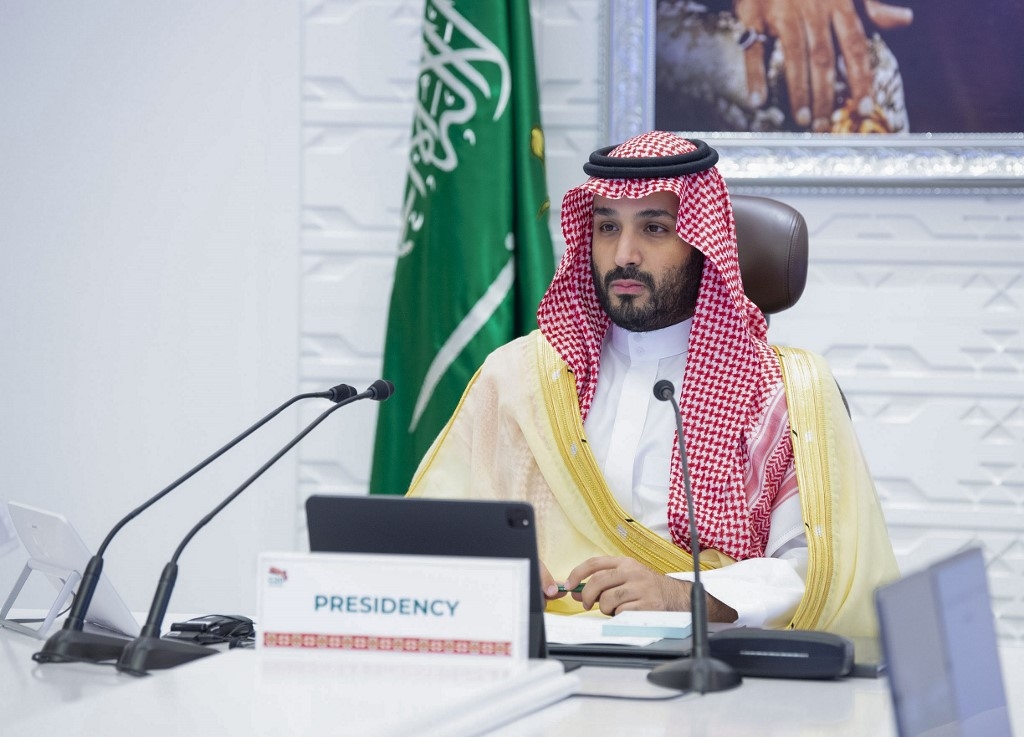
Saudi Crown Prince Mohammed bin Salman was reluctant to accede to demands from Israeli Prime Minister Benjamin Netanyahu to agree to an attack on Iran when they met last Sunday in Neom, Saudi sources with knowledge of the meeting told Middle East Eye.
Bin Salman's reluctance was said to be for two reasons. Firstly, he read two recent attacks on Saudi oil targets as warning messages from Iran delivered by proxies.
Secondly, he doubts the US response under President-elect Joe Biden's incoming administration, in the event of a prolonged series of strikes and counter strikes, believing Biden's first response to a Gulf crisis would be to de-escalate before negotiating a nuclear deal with Tehran.
In last Sunday's tripartite meeting, the outgoing US Secretary of State Mike Pompeo did not commit to an attack on Iran's uranium processing installations, a Saudi source with knowledge of the meeting told MEE.
Speaking on condition of anonymity, the source said: "In the meeting, Netanyahu was advocating hitting Iran. Pompeo did not commit either way."
In Riyadh, the threat of a US attack on Iranian uranium enrichment facilities is still very much live, despite signs that outgoing US President Donald Trump at last appears willing to concede that he lost the election.
In recent weeks, two B52 bombers practised a sortie from a base in North Dakota over the Gulf, involving other US combat and refuelling aircraft.
Acting Secretary of Defence Christopher Miller is currently on another trip to the Gulf, visiting US airbases in Bahrain and Qatar, ostensibly to wish US servicemen well over Thanksgiving.
The Saudi source said the latest attacks on sites in the kingdom were clearly proxy messages from Iran.
The two most recent attacks on Saudi oil installations are a strike by a Quds 2 missile launched by Iran-backed Houthis on an oil tank at Aramco's plant in north Jeddah, and a limpet mine attack on a Greek-owned tanker in the Red Sea port of Shuqaiq.
The missile strike in north Jeddah was the largest scale assault on an Aramco installation since drone strikes hit Abqaiq and Khurais, halving the kingdom's oil production for a few months in 2019.
Riyadh officially denied that last Sunday's meeting took place after details were first reported by Israel's Haaretz newspaper.
"No such meeting occurred," Saudi Foreign Minister Prince Faisal bin Farhan Al Saud tweeted.
A US State Department statement about Pompeo's meeting with the crown prince in Neom did not mention Netanyahu.
"They discussed the need for Gulf unity to counter Iran's aggressive behaviour in the region and the need to achieve a political solution to the conflict in Yemen," it said.
Netanyahu's office has not commented on the meeting, but Israeli Minister of Defence Benny Gantz said: "The leaking of the secret flight of the prime minister to Saudi Arabia is an irresponsible step."
Netanyahu's visit, on which he was accompanied by Mossad chief Yossi Cohen, marked the first known high-level meeting between an Israeli and a Saudi leader, though the two are reported to have met privately in the past.
Messages from Tehran
The Iranian "messages" to Riyadh conveyed by the attacks on oil facilities are part and parcel of a broader communications offensive by Iran.
Last week, MEE reported that Iran had dispatched one of its top generals to Baghdad to order allied Iraqi factions to cease all attacks until Biden is in the White House.
Brigadier-General Esmail Qaani was explicit in his instructions to paramilitary leaders on Wednesday.
"Qaani made it clear that Trump wants to drag the region into an open war before leaving, to take revenge on his opponents over losing the election, and it is not in our interest to give him any justification to start such a war," a senior commander of a Shia armed faction, who was among those briefed about what was said at the meeting, told MEE.
According to MEE's sources, Iran believes an attack order by Trump is still an imminent threat.
"They are telling Saudi that you will pay the price for anything that happens to us. MBS knows that if Trump attacks the Iranians, Saudi will not get US protection from Biden," a source said.
"He is now reluctant for such a thing to happen under Trump. That was clear in the meeting."
The sources, who have direct knowledge of the events in the Saudi royal court, described the crown prince as "anxious and very nervous".
"MBS is living his worst days since he became crown prince. His main concern is Biden. He feels this administration will be hostile to him, and with the world not forgetting all that he has done, the murder of Jamal Khashoggi, the imprisonment and mistreatment of women activists, he really does not know what to do," a second source said.
MBS's reluctance to normalise
Trump, his son-in-law Jared Kushner, and Pompeo have each pressurised the crown prince, the kingdom's de facto ruler, to normalise relations with Israel, and this effort has apparently continued since the US election.
At first, Pompeo tried to strong-arm bin Salman into a public meeting with Netanyahu. In the end, a compromise was reached. The meeting in Neom would be secret, but it would be agreed beforehand that Netanyahu could leak it.
The Neom meeting was duly leaked to the Israeli media and the Israeli censor, the official body which forbids publication of reports of contacts with countries with which Israel has no diplomatic relations, remained silent.
The crown prince's reluctance to normalise relations with Israel does not stem from a sympathy with the Palestinian cause.
"He does not care about the Palestinians. He loathes them. Not one single cell in his body has any concern for their cause," the source said.
Bin Salman knows, though, that if he pushes for normalisation now, this would have to happen under the name of his father, King Salman.
"Such a step has to have the stamp of approval of his father. And in whatever stage of consciousness and mental alertness the king is, he is implacably opposed to this," the source said, referring to the king's reported dementia.
"In these circumstances, normalisation will not be easily sold to the Saudi people."
'Please Trump'
Pompeo was blunt with bin Salman. The outgoing secretary of state told the Saudi prince that under a hostile Biden administration he had only two protectors left in the US.
The first was the pro-Israel lobby and the second was the Republican caucus in the Senate.
Pompeo told the crown prince he has to please Trump if he wants to continue benefiting from protection from the new administration.
Bin Salman was described as anxious and concerned about Biden.
Biden has repeatedly promised to hold Saudi Arabia accountable for human rights violations and has pledged to limit weapons sales and treat the kingdom as a "pariah". He has said he believes bin Salman ordered Khashoggi's murder in 2018.
He has also promised what would amount to a 180-degree turn of policy on Iran, spurning the policy of maximum pressure through sanctions, and turning once more to the negotiating table.
A lot of the enemies the crown prince has created on his rise to power will see the Biden administration as their ally.
This will include some of the top princes bin Salman has had arrested and detained - his elder cousin, the former crown prince Mohammed bin Nayef, and his uncle Prince Ahmed bin Abdulaziz, who has publicly opposed MBS.
Son who needs his father
The crown prince's awareness of his own vulnerability has led him to depend on his father as a figurehead even more than in the past.
During the virtual G20 meeting in Riyadh, King Salman was pushed to the front, with MBS absent from the official photograph, unlike at previous meetings of the G20 where he represented the kingdom.
King Salman has also been used to renew strained ties with Turkish President Recep Tayyip Erdogan. He did this is in a telephone call to Erdogan, suggesting that the foreign ministers of both countries should meet to resolve the issue of the kingdom's unofficial boycotting of Turkish goods.
Saudi relations with Turkey have been under intense strain for two years since Erdogan refused to stop calling for an international inquiry into the murder of Khashoggi inside the Saudi consulate in Istanbul.
The olive branch being offered now by Riyadh is chiefly down to the fact that when Biden opens up to Iran, both Saudi Arabia and Turkey will need each other.
The war in Yemen is another of the crown prince's major concerns.
"The economy is haemorrhaging on a much bigger scale than officially announced to pay for the cost of the Saudi military operation in Yemen. His main ally, MBZ [Mohammed bin Zayed, crown prince of Abu Dhabi] has got what he wanted [control of the south], and MBS is left with the real war with the Houthis," a source said.
Bin Salman, who also occupies the role of defence minister, is short of troops on the ground and has turned to Egypt's President Abdel Fattah el-Sisi. But Sisi is unwilling to oblige.
Egypt feels it is paying the price for the Emiratis' breakthrough diplomatic recognition of Israel. According to Cairo, the recognition has established a pattern of trade deals in which Israel has become the Mediterranean gateway to the Gulf, bypassing Egypt and making the Suez Canal redundant.
These deals include an oil pipeline, a high-speed railway and now plans by Google to lay a fibre optic cable linking Saudi Arabia and Israel, which will connect Europe to India.
"The Egyptians are starting to feel the heat about it," said a source.
"He is very concerned about the future," the source said of the Saudi crown prince. "The meeting happened because he is willing to pay the price, to please Israel and keep Trump and the Republicans onside.
"Although he hoped by now to be king, he now realises he needs his father more than ever before."
This article is available in French on Middle East Eye French edition.
Middle East Eye delivers independent and unrivalled coverage and analysis of the Middle East, North Africa and beyond. To learn more about republishing this content and the associated fees, please fill out this form. More about MEE can be found here.


